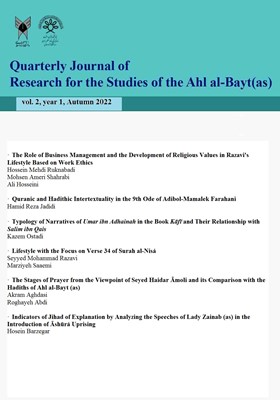Islamic Lifestyle with the Focus on Verse 34 of Surah al-Nisá
Subject Areas : Quarterly Journal of Research for the Studies of the Ahl al-BaytSeyed Mohammad Razavi 1 , Marziyeh Saemi 2
1 - Assistant professor, Central Tehran Branch, Islamic Azad Uinversity, Tehran. Iran.
2 - PhD Student of Quranic Science and Hadith, Central Tehran Branch, Islamic Azad University, Tehran, Iran.
Keywords: Community, lifestyle, Family, Qayūmīyat, Qur’an and Islamic Traditions,
Abstract :
Lifestyle in Islamic culture is a set of beliefs, values, dos and don’ts that originates from the two sources of the Qur'an and ʿItrat. The general principles and characteristics of an Islamic culture that helps the transcendent lifestyle are generally stated in the verses of the Qur'an and its details have been explained by the infallible Imams and with its divine centrality gives direction to all aspects of life, the end of which is the individual and social transcendent of the community. The most controversial verses of the holy Qur’an is: “Men are the protectors and maintainers of women”, which in the legal system of Islam has been cited as a significant criterion in expressing the legal rules; the present study is based on the descriptive-analytical method acquiring a lifestyle based on holy verse, the author after examining the meaning of guardianship and expressing other points with regard to this holy verse, and the expression of the Islamic view (Qur'an and narrations), it has concluded that Qawwāmiyat means to have the right to manage, to protect, to be the head of the family, and it doesn’t include the meaning of Wilāyat and to have authority, in the lifestyle, especially the Islamic lifestyle, because, men have priority over women in intellect and tact, and they have more endurance in severe hardships and problems and women are emotional and emotional, so due to these bestowed and acquired virtues, men have priority over women in protecting them, and this becomes the cause of the transcendent lifestyle, while Many verses of the Holy Qur'an considers the men and women peers and remind the perfection and imperfection of both them at the same time and explicitly describes their unity, so Islam considers no difference between them in moving and traveling to God and the path to God is possible by pious thinking and acting.
_||_


